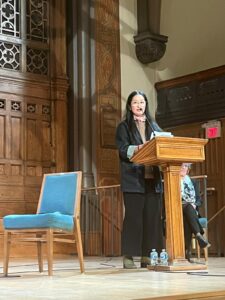 On Monday, January 13, 2025, former Toronto mayors David Crombie and John Sewell hosted an event in support of supervised consumption sites at Trinity St. Paul’s Centre in downtown Toronto.
On Monday, January 13, 2025, former Toronto mayors David Crombie and John Sewell hosted an event in support of supervised consumption sites at Trinity St. Paul’s Centre in downtown Toronto.
Moderated by former Ontario premier Kathleen Wynne, speakers included former Toronto mayor Barbara Hall, researcher and epidemiologist Dr. Mohammad Karamouzian, Rev. Katherine McCloskey, Toronto councillor Chris Moise. People also had the opportunity to hear from Bill Sinclair of The Neighbourhood Group Community Services, Angela Robertson of Parkdale Queen West Community Health Centre, and Lin Sallay of Street Health, each of which operate supervised consumption sites in Toronto.
HIV Legal Network Co-Executive Director Sandra Ka Hon Chu spoke at the event and presented the following remarks:
Thirteen years ago, my organization, the HIV Legal Network, intervened in the first and only case before the Supreme Court of Canada about the constitutionality of SCS in Canada, Canada (Attorney General) v PHS Community Services Society 2011 SCC 44. In its historic decision, the Court said, “While it is for the relevant governments to make criminal and health policy, when a policy is translated into law or state action, those laws and actions are subject to scrutiny under the Charter.”
As the Court noted then, “Insite saves lives. Its benefits have been proven. There has been no discernable negative impact on the public safety and health objectives of Canada during its eight years of operation.” The Court thus concluded that the Health Minister’s decision not to authorize Insite to continue operating was a breach of section 7 of the Charter: the right to life, liberty, and security of the person.
 We know Ford’s lawyers took note when drafting the Community Care and Recovery Act. As media reported at the time the legislation was announced, the government “received legal advice that the prohibition of supervised consumption sites within 200 metres of a school or childcare centre creates a ‘high risk’ of infringing the Charter” and that in order to defend itself against a Charter challenge, the government would need to demonstrate that their operation is “always unsafe or harmful, even when operated under reasonable conditions.” As was the case 13 years ago, Ford’s lawyers said that “Counsel is unaware of such evidence.”
We know Ford’s lawyers took note when drafting the Community Care and Recovery Act. As media reported at the time the legislation was announced, the government “received legal advice that the prohibition of supervised consumption sites within 200 metres of a school or childcare centre creates a ‘high risk’ of infringing the Charter” and that in order to defend itself against a Charter challenge, the government would need to demonstrate that their operation is “always unsafe or harmful, even when operated under reasonable conditions.” As was the case 13 years ago, Ford’s lawyers said that “Counsel is unaware of such evidence.”
There is simply no evidence that a supervised consumption service near our children’s schools or daycares will hamper public safety. Community safety is upheld when all people have access to life-saving healthcare, when people are not vilified for their drug use, and when human rights are upheld.
But the Community Care and Recovery Act does the opposite: it will effectively prevent supervised consumption services from operating and expanding in this province at a time when more than 10 Ontarians die every day from the toxic, unregulated drug market, breaching the Charter rights of people who use drugs.
That is why The Neighbourhood Group Community Services and two individuals, Katie Resendes and Jean-Pierre Aubry Forgues, backed by a pro bono legal team, brought an application last month, seeking an order from the Ontario Superior Court of Justice that the Act violates sections 7, 12, and 15 of the Charter, or, in the alternative, that it is otherwise unconstitutional because it encroaches on Canada’s exclusive jurisdiction over criminal law. As the Applicants argue in their notice of application:
- Section 7 of the Charter guarantees the right to life, liberty, and security of the person; by closing SCS, people who no longer have access to SCS will face a dramatically increased risk of death by overdose — engaging their life interest. Second, individuals who will be forced to consume outside these sites will be exposed to a higher risk of criminal sanction — thereby engaging their liberty interest. Finally, the Act infringes service users’ security of person interest, because the evidence is clear that they will be exposed to a higher risk of HIV, hepatitis C, and other infections, and other harms to their health.
- Section 12 of the Charter protects against cruel and unusual treatment or punishment. People who use drugs have come to rely on these services for their daily survival. Without these services, people who use drugs will be exposed to substantially increased risk of death, infection, and a variety of other harms. Ontario knew this when it passed the Act but proceeded to pass it anyway. By doing so, Ontario knowingly increased the likelihood of death and grievous bodily harm.
- Section 15 of the Charter guarantees the right to be free from discrimination, and the Act clearly discriminates against people who use supervised consumption services. Under the Act, the only reason they will be denied these services is because of an immutable characteristic that they have: a substance use disability. These disadvantages are even more pronounced for service users who also identify as women, who are Indigenous, or are otherwise racialized. Denying these individuals access to these services will only make it harder for them to get the health services they need for no reason other than the fact that they suffer from a disability that the Government of Ontario has targeted.
Even if the Act does not violate the Charter, it still violates the Constitution. Only the Government of Canada can make criminal law, but Ontario is attempting to usurp Canada’s powers with this Act, or at the very least, the Act frustrates the purpose of the regime that the federal government established to allow for SCS.
In short, the Community Care and Recovery Act will have catastrophic consequences for people who use drugs in Ontario. It will deprive people of life-saving healthcare and block municipalities from implementing evidence-informed, life-saving measures tailored to their community’s needs. It is critical that this legislation is challenged, and we are grateful to The Neighbourhood Group Community Services and the two individual applicants for defending the Charter rights that this legislation breaches.
